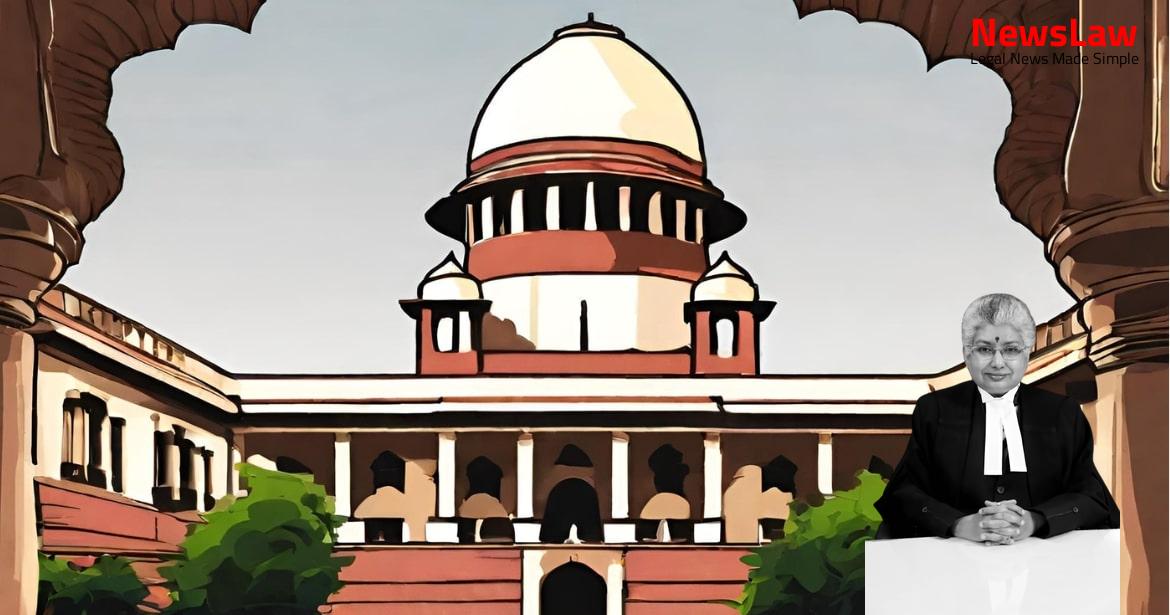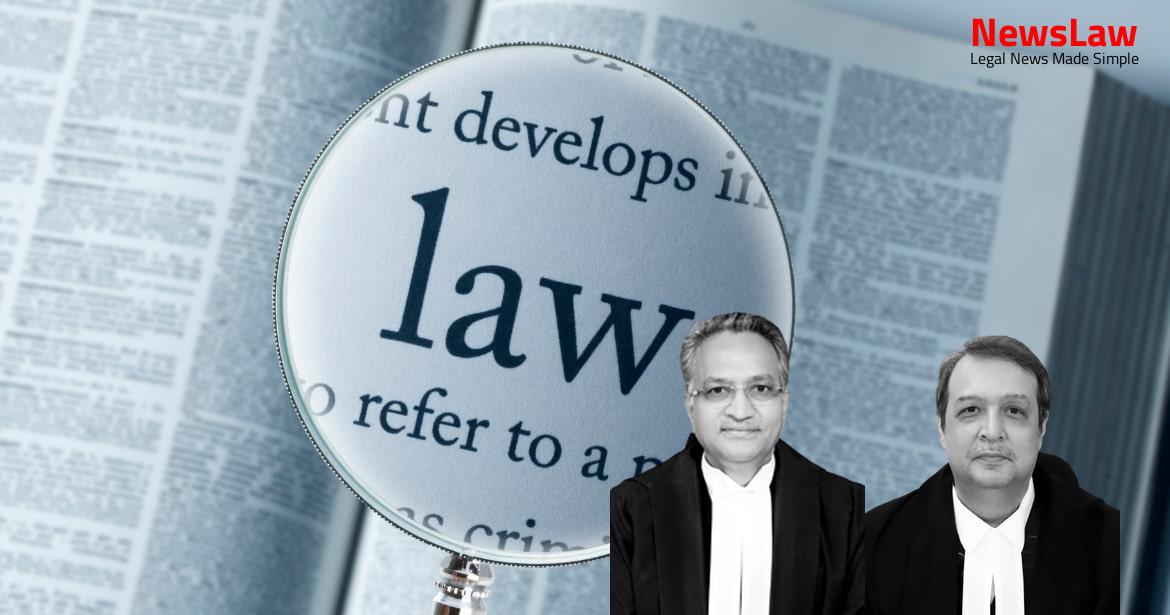Delve into the legal intricacies surrounding the jurisdiction and authority of Special Courts established under the NIA Act in a recent case. The analysis primarily focuses on the procedural aspects related to the existence of Special Courts and their role in handling cases involving scheduled offences. Stay tuned for in-depth insights into the functioning and significance of Special Courts in the context of the NIA Act.
Facts
- Mohammad Shahed Khan filed a bail application before the NIA Special Court on 27 April 2021, which was rejected on 22 June 2021.
- Naser Bin Abu Bakr Yafai’s application was rejected by the ASJ, Nanded on 14 November 2016 as the NIA Mumbai had not taken over the investigation at that time.
- The ATS Nanded filed a charge-sheet on 7 October 2016 against accused persons under various sections of IPC, UAPA, and ES Act before the CJM, Nanded.
- Yafai contended that the CJM, Nanded had no jurisdiction to handle the case as UAPA offenses are under the NIA Act and the CJM was not a ‘Court’ established under the NIA Act.
- The Ministry of Home Affairs directed the NIA to take over the investigation on 8 September 2016.
- The NIA Mumbai informed ATS Nanded of taking over the case on 23 November 2016 and received the case papers on 8 December 2016.
- The Government of Maharashtra designated the CJM as a Court of remand and ASJ as a Special Court to try cases by ATS Nanded.
- The NIA Mumbai renumbered the case on 14 September 2016 for further investigation.
- The ASJ, Nanded handled Yafai’s bail application on 21 October 2016 under Section 167(2) of CrPC.
- Naser Bin Abu Bakr Yafai was one of the arrested individuals along with three others by ATS Nanded based on information regarding associations with terrorist organizations.
- The NIA Mumbai is currently conducting further investigation into the matter.
- Mohammad Shahed Khan filed an SLP to challenge a judgment despite not being a party to the proceedings.
- NIA Mumbai filed an application under Section 407(2) of the CrPC for transfer of trial records to the NIA Special Court.
- SDJM dismissed appellant’s application for default bail citing an extension of time under Section 167 of the CrPC.
- Appellant wrote to the Chief Justice of the Bombay High Court claiming illegal detention due to an investigation handover.
- High Court noted the power of the Magistrate to extend investigation up to 180 days under CrPC and UAPA.
- Appellant succeeded in a revision petition on 25 March 2019 stating only the Special Court could pass orders under UAPA.
- Despite this, the Special Court dismissed the appellant’s revision petition against the order of 25 February 2019 on 11 April 2019.
- High Court affirmed ASJ, Nanded’s jurisdiction to try UAPA offences until the NIA took over investigation.
- A charge-sheet was filed on 26 March 2019 before the Special Court in the case.
- Naser Bin Abu Bakr Yafai filed a special leave petition challenging the Bombay High Court’s order.
Also Read: Electoral Malpractices in Mayor Election
Issue
- Check if there is a Special Court under Section 22 of the NIA Act
- Assess the jurisdiction and authority of the Special Court in the case
- Evaluate the procedural aspects related to the Special Court’s existence
Also Read: Balancing Power and Transparency: Electoral Bonds Struck Down, Disclosure Mandated
Arguments
- The registration of an FIR by NIA Mumbai marked the beginning of the investigation in the case.
- The ATS Nanded continued investigating and filed a charge-sheet before the CJM, Nanded after the FIR was renumbered by NIA.
- Section 6(4) and 6(6) of the NIA Act lay down three stipulations regarding the investigation by NIA.
- There is a statutory obligation for NIA and State Police Agency to collect and transmit relevant documents immediately to NIA.
- The charge-sheet filed by ATS Nanded before CJM may be considered a nullity as it should have been filed in the Special Court under the NIA Act.
- Committal proceedings may also be nullified as the Special Court is empowered to take cognizance without committal as per Section 16(1) of the NIA Act.
- A notification for setting up Special Courts under Section 22 was issued by the Government of Punjab on 10 June 2014.
Also Read: Recall of Resolution Plan Approval: Legal Analysis
Analysis
- Section 6 of the NIA Act outlines the procedure for the Central government to determine if an offence should be investigated by the NIA.
- The Central government can direct the NIA to investigate a scheduled offence if it deems it fit for NIA investigation.
- The Central government has the power to suo motu direct the NIA to investigate, bypassing the State government.
- Upon such a direction, the State government and police must cease their investigation and transfer relevant documents to the NIA.
- The officer in-charge of the police station is obligated to continue the investigation until the NIA officially takes over.
- These provisions aim to avoid a vacuum in investigation between the direction issuance and NIA taking over.
- The NIA Act mandates that until the NIA initiates the investigation, the State police has the authority to investigate scheduled offences.
- Special Courts, as per the NIA Act, have exclusive jurisdiction over cases investigated by the NIA.
- These provisions ensure a smooth transition of investigation from State agencies to the NIA in cases of scheduled offences.
- The NIA Mumbai renumbered the case on 14 September 2016, but the actual investigation began after the records were handed over on 8 December 2016.
- Section 6(7) of the NIA Act allowed ATS Nanded to continue the investigation until NIA Mumbai took over.
- The investigation by ATS Nanded and filing of the charge-sheet were in accordance with the statutory mandate.
- The issuance of directions under Section 6(4) or (5) did not prohibit ATS Nanded from continuing the investigation until the case was transferred.
- The Special Court designated under Section 22 has jurisdiction once NIA Mumbai takes up the investigation.
- The Government of Maharashtra designated a Special Court for trial of scheduled offences under the NIA Act.
- The ATS Nanded acted within the mandate of Section 6(7) until the NIA Mumbai took over the investigation.
- An investigation commences upon the receipt of information by the police disclosing the commission of a cognizable offense.
- The power to extend the 90 days period of remand up to 180 days was with ‘The Court’.
- Default bail is an indefeasible right of the accused under the first proviso to Section 167(2) of the CrPC.
- The right to default bail becomes complete if the application for it is made on the expiry of the 90 days before a charge-sheet is filed.
- Investigation begins with the police taking the first step based on the disclosed information, such as proceeding to the spot, collecting evidence, speaking to a witness, or arresting the accused person.
Decision
- The CJM, Nanded could have committed the case to trial before the ASJ, Nanded upon the filing of charge-sheet by the ATS Nanded as they were the designated Courts for the ATS Nanded.
- No Special Court had been designated by the Government of Maharashtra under Section 22 of the NIA Act.
- Both the CJM and ASJ of Nanded had the jurisdiction to entertain the case under the UAPA until the NIA Mumbai took over the investigation and sought a transfer of the case to the NIA Special Court at Mumbai.
- The ATS Nanded was not barred from continuing with its investigation until the NIA Mumbai actually took up the investigation.
- The judgment and order of the High Court dated 5 July 2018 are affirmed.
Case Title: NASER BIN ABU BAKR YAFAI Vs. THE STATE OF MAHARASHTRA (2021 INSC 649)
Case Number: Crl.A. No.-001165-001165 / 2021



